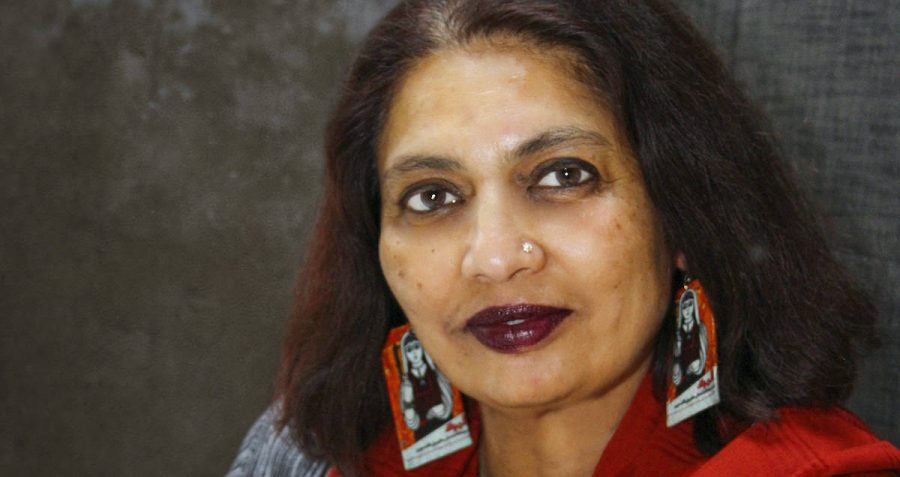Speaker says transnational, anti-imperial and anti-capitalist feminism is imperative
Feminist scholarship leader Dr. Chandra Talpade Mohanty gave International Women’s Day keynote address Monday evening
Photo by Submitted
Chandra Talpade Mohanty, Ph.D., was the International Women’s Day keynote speaker. Her work in transnational feminism produced several essays, books and videos.
Feminists must be transnational, anti-imperialist and anti-capitalist in their struggle for liberation, said International Women’s Day keynote speaker Chandra Talpade Mohanty, Ph.D., during her presentation Monday evening in the Davies Student Center on the UW-Eau Claire campus.
The presentation, titled “Borders and Bridges: Neoliberal Regimes, Anti-Fascist Struggles and Insurgent Feminist Praxis,” centered around Mohanty’s area of expertise: transnationalism. The term “transnationalism,” as defined by Mohanty, means looking at the worldwide systems that transcend national borders. For example, capitalism is an economic system and power structure that transnational feminists study.
Before Mohanty spoke, Carter Khab was given the Dr. Chandra Talpade Mohanty Transnational Feminism Award.
Mohanty is a leader in feminist scholarship. She is a distinguished professor and dean’s professor of the humanities at Syracuse University, where her work “examines the politics of neoliberalism” in academia and in social movements. Mohanty is developing a video archive that catalogs intergenerational conversations with feminist scholars and activists across the globe.
She is also authored several books, including “Feminism Without Borders: Decolonizing Theory, Practicing Solidarity” and “Feminist Genealogies, Colonial Legacies, Democratic Futures.”
In order for activists to effectively organize, Mohanty said, they must understand that the issues they’re fighting against exist locally, nationally and globally. Issues involving race, class, gender and ability are connected, in some way, to a transnational problem.
“It’s way too easy for us to say, ‘Well, that’s not me,’ ” Mohanty said.
To illustrate her points, Mohanty highlighted three global locations that — although geographically separated by borders — are experiencing violence because of capitalism, imperialism and colonialism.
These locations are:
In each of these places, Mohanty said people are subjected to gender and race-based violence, militarization and colonization. She said governments and people in power utilize security, mass incarceration and mass deportation to maintain their control and normalize violence.
Mohanty admitted that her work can get depressing, but she said she is still able to find hope in cross-border coalition building.
“I don’t allow myself to feel despair, because despair is a weapon of power. We can’t afford to feel despair,” Mohanty said.
Community-building and acts of solidarity are key ingredients to success, Mohanty said. Women of color must use their everyday experiences to lead activist movements.
Mohanty gave listeners four tips for an “insurgent lifestyle:”
Question everything. Connect issues to the bigger picture and be sure to “denaturalize and demystify” what seems normal.
Cultivate “radical communities of dissent.”
Seek unlikely coalitions
Remember that one is not the first (or last) to resist, and that activism and scholarship are legacies to claim.
Carleen Baron, a fourth-year vocal performance student with a minor in women’s, gender and sexuality studies, said she found Mohanty’s presentation applicable to her coursework.
“I never thought about imperial democracy being something that happens outside the U.S.,” Baron said, “and so that whole concept of transnationalism (Mohanty) talked about gives me a new framework to think about things with.”
Monday’s keynote address was the first of many campus events for Women’s History Month. At noon this Friday in room 1142 of Vicki Lord Larson Hall, there will be a panel about sexism in the workplace. A feminist bingo and dance party will be at 7:30 p.m. Thursday, March 19 in the Ojibwe Ballroom of the Davies Student Center.
Neupert can be reached at [email protected].

Neupert is a fourth-year journalism student at UW-Eau Claire. She is the executive producer of Engage Eau Claire on Blugold Radio Sunday. In her spare time, Neupert's working on becoming a crossword puzzle expert.











